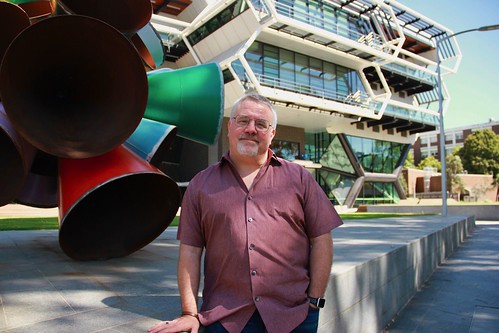Professor John C. Warner has been appointed as one of four of the University of Bath’s Global Chairs for 2020/2021. Hosted by Bath’s Centre for Sustainable and Circular Technologies, Professor Warner is hosting a series of online seminars on Sustainability, the first of which was held this week. A pioneer of green chemistry and one of the world’s most prominent proponents of sustainable technologies, Warner is recognised for his leadership and expertise spanning academia, industry, and policy.
His career has been varied, working with universities and institutions internationally, collaborating with governments to share his expertise, and creating and developing businesses and innovations to support global sustainability. John is currently a distinguished research fellow at the Zymergen Corporation, where he is helping to design and create commercial technologies inspired by nature and consistent with the principles of green chemistry. He also serves as Distinguished Professor of Green Chemistry at Monash University and is President and Chief Technology Officer of the Warner Babcock Institute for Green Chemistry.
Professor Warner began his Sustainability series of monthly webinars this week, with “Nature’s Mechanism – the Circular Economy and Plastics in the Environment”. Describing his first lecture as a depiction of the ‘big picture’ of today’s landscape, Warner introduced the idea of green chemistry and its relationship with other fields, such as bio mimicry and the circular economy. He discussed the uses for chemistry in society and demonstrated the circular economy and what that means for our global societies. He also emphasised the need to design perfect systems for sustainability, which allowed for big picture thinking, but that also prepared and allowed for things to go wrong. Warner spoke passionately and enthusiastically about the hope that he has for the future of development of sustainable technologies, giving examples of molecular mechanisms from nature that have been used to shape real-world technologies.
He will continue the webinar series next month, 19 November 2020, with his second lecture – Introduction to Green Chemistry – the 12 Principles in Real World Examples.
Please find below the rest of the webinar series. Please click on the headings to register.
Introduction to Green Chemistry – the 12 Principles in Real-World Examples
When: 19 November 2020, 13.00-14.30 GMT
Learning outcomes: Provides a working introduction to the field of green chemistry and the 12 principles with illustrative examples of commercialized technologies.
- What is Green Chemistry and what are its principles?
- How do corporations use green chemistry to achieve goals of performance and cost?
- What are some real-world examples of Green Chemistry?
Society’s Perspective, the UN SDGs and a Future View of Chemicals Policy
When: 21 January 2021, 13.00-14.30 GMT
Learning outcomes: Provides a lens to the view consumers, NGOs and government agencies relate Green Chemistry to industry and consumer products.
- How do non-chemists view the field of chemistry?
- How does chemistry apply to all 17 of the UN SDGs?
- How can chemists help improve global chemicals policies?
R&D and Design – Case Studies and Innovation
When: 18 February 2021, 13.00-14.30 GMT
Learning outcomes: Discusses the role Green Chemistry plays in creativity and invention at the R&D and product design stage.
- What are the elements of innovation and how can they enhance creativity?
- What are some examples of early-stage research being translated into commercial applications?
- How to discover the commonality of molecular mechanisms across seemingly unrelated fields of science?
Introduction to Mechanistic Toxicology
When: 18 March 2021, 13.00-14.30 GMT
Learning outcomes: Gives an overview of the fields of toxicology and environmental health sciences, and a somewhat non-technical foundation of general concepts.
- What are the basic concepts of mechanistic toxicology to help me better understand related literature?
- How can I use knowledge from the fields of toxicology and environmental health sciences to be a better chemist?
- How do I make the chemistry I am designing safer for humans and the environment?
When: 15 April 2021, 13.00-14.30 BST
Respond
